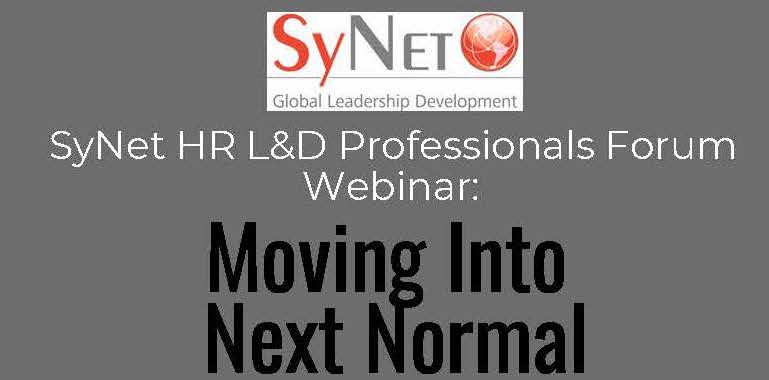In May 2020, SyNet Global hosted two virtual Client Forums focused on dealing with complexity and ambiguity and how to address this in the talent development world. More than 44 clients from the HR, Learning & Development and Talent Development functions from around the world, in large and small organizations, attended these lively discussions and provided insights into what has worked and what has been challenging to navigate during this unprecedented time.
Some of the questions we posed included:
- What are potential trends, concerns and shocks that resulted from the recent Covid-19 disruption?
- What emergent HR and L&D practices did you and your colleagues put into place in response to the disruption?
Resilience Thinking
One of the key outcomes these leaders of talent development functions revealed through the discussion was that having a broader view of issues, concerns and options in any crisis helps individuals to demonstrate resilience in their thinking. They defined resilience thinking as being ready for anything without planning for everything.
Concerns and Shocks
Leaders in the learning and development and HR space shared concerns and noted that some of the shocks as a result of COVID-19 included:
- Running into a strong group of employees with a mindset that “things cannot be done”. and knowing that they must still change that “Cannot-Be-Done” mindset to move forward.
- An increasing amount of experimentation going on without needing things to be perfect before trying them out (more prototyping going on)—this was one of the more pleasant shocks.
- Surprise at how long the effects of the change lasted/is lasting.
- The domino effect of addressing COVID-19 revealed how interconnected we all are, how important it was to have distributed decision making as a result.
- Practical concerns of how to plan for and handle the need to be in-person in the future and expectations for business travel.
Practices Put in Place
As expected, the talent development and HR leaders were involved in critical practices to navigate this volatile time. Some of the emergent practices they mentioned that were put into place were:
- Special teams for Covid-19 handling
- Video guides and toolkits addressing specific skills needed or questions to be answered
- Surveys on empathy
- Virtual training
- Increased ability and encouragement to use different types of technology
- Increased/more governance up front as teams worked in new structures and remotely
- Sprint teams who focused on specific challenges
- Acknowledgement that less perfection and more speed were necessary from senior leaders
- “North star” issue identification and communication about this so that people could rapidly decide what to do, especially as topics and needs were quickly changing.
- Workplace flexibility
- Health and safety measures
Discussions Raised Philosophical Questions
As we discussed how we can be ready for anything without planning for everything, client forum participants pointed out that being more open-minded, learning and advancing new skills, responding and reacting more quickly, looking at what the ‘minimal viable products or services’ they could put in place to solve a solution and changing expectations from leaders seemed to be important.
This discussion led to more questions arising such as:
- How far can we plan?
- How agile can we be?
- What did we learn that we can bring forward?
Getting Back to Better with a Wisdom Council
Forum members discussed having a “getting back to better” mindset as a way for those in learning and development, HR and talent management to have in order to be more agile. All agreed that developing a “Wisdom Council” may be helpful. The purpose of the Wisdom Council is to: Prevent, Prepare, Recover. Many participants realized we would never have had these conversations before this disruption—it has been a time to strengthen our own resilience thinking as well.
Responses in Crisis
As in any crisis, we see three general responses:
Neurotic = denial
Chaotic = panic
Transformative = learning and doing
The more transformative, the more likely we are to ‘get back to better.’ This time to pause as a group during the Client Forum and learn from others allowed us to practice resilience in real time and use the experience as a ‘real life’ action learning process for the SyNet talent development community.


